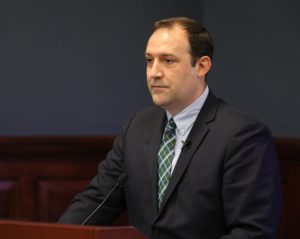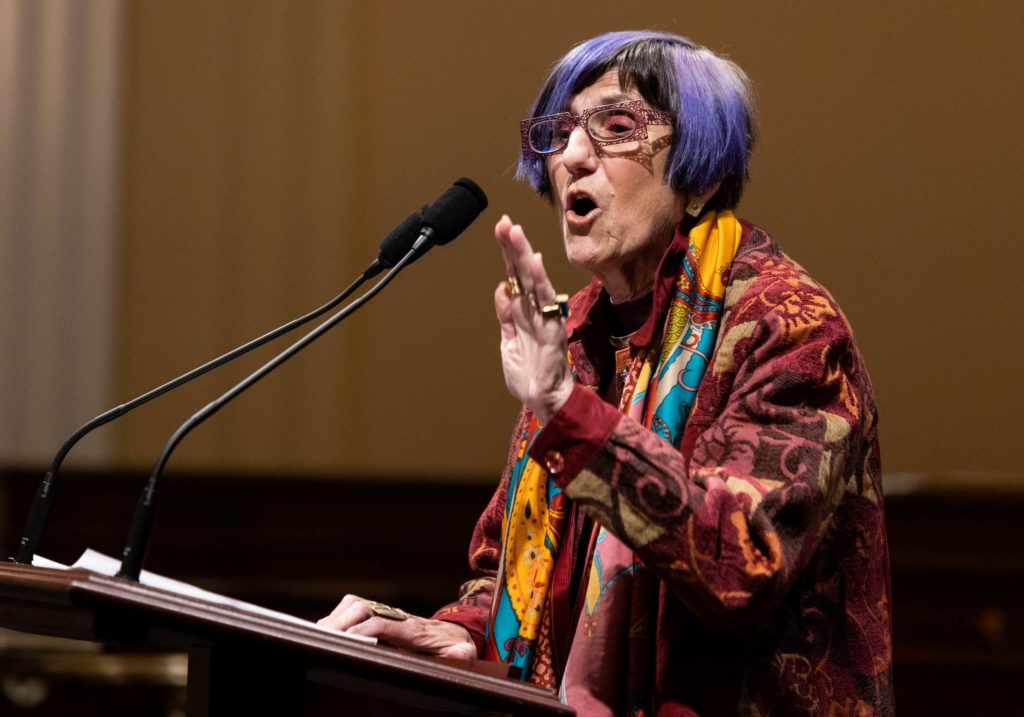After more than two dozen Catholic Democratic House lawmakers signed a "statement of principles" advocating for abortion access that cited tenets of their faith as their rationale, the U.S. bishops and other Catholics pushed back, arguing their position was contrary to church teaching.
The president of the U.S. Conference of Catholic Bishops and the chairmen of the USCCB's pro-life and doctrine committees said in a joint statement issued late June 28 that invoking "teachings of the Catholic faith itself as justifying abortion or supporting a supposed right to abortion grievously distort the faith."
The Second Vatican Council "called abortion an 'unspeakable crime," Stephen White, executive director of The Catholic Project at The Catholic University of America, told OSV News the same day. Kristen Day, executive director of Democrats for Life, said that "as Catholics, it is our duty to live and advance our faith, not excuse or walk away from the faith when faced with political pressure."
Rep. Rosa DeLauro, D-Conn., who spearheaded the lawmakers' statement, was joined by 30 other self-identified Catholics who are Democrats in the House -- including former Speaker Nancy Pelosi of California -- in arguing that when the Supreme Court issued its decision in Dobbs v. Jackson Women's Health Organization, it "stripped women of their right to abortion and escalated an ongoing reproductive healthcare crisis in this country."
"Today, as Catholic Democrats serving in the House of Representatives, we are proud that we are part of the faithful pro-choice Catholic majority -- 68 percent of whom supported the legal protections for abortion access enshrined in Roe and 63 percent of whom think abortion should be legal in all or most cases," the lawmakers wrote June 24. "Our faith unfailingly promotes the common good, prioritizes the dignity of every human being, and highlights the need to provide a collective safety net to our most vulnerable."
Their statement reaffirmed a similar effort in 2021, in which many of the same lawmakers argued that "we seek the Church's guidance and assistance but believe also in the primacy of conscience," and that Catholic lawmakers who support legal abortion should not be denied Communion. That earlier statement came as the U.S. bishops, gathered for their spring plenary assembly, debated the drafting of a document on the centrality of the Eucharist in the life of the church, with some prelates saying it should include a call for Catholics in public office who support abortion, like President Joe Biden, to be denied Communion.
But the final document, "The Mystery of the Eucharist in the Life of the Church," approved at the bishops' November 2021 meeting, did not include that language and was addressed to all U.S. Catholics "to deepen our people's awareness of this great mystery of faith."
The lawmakers' June 24 statement further cited the writings of St. John Paul II, arguing that in his 1988 apostolic exhortation on the role of the laity, "Christifideles Laici," he wrote that the church "is the 'people of God,' called to be a moral force in the broadest sense."
"We believe the Church as a community is called to be in the vanguard of creating a more just America and world," the letter said. "The fundamental tenets of our Catholic faith -- social justice, conscience, and religious freedom -- compel us to defend a woman's right to access abortion. We are committed to advocating for the respect and protection of those making the decision if and when to have children."
The USCCB statement opposing the lawmakers' statement was issued by Archbishop Timothy P. Broglio of the U.S. Archdiocese for the Military Services, USCCB president; Bishop Michael F. Burbidge of Arlington, Virginia, chairman of the USCCB's Committee on Pro-Life Activities; and Bishop Daniel E. Flores of Brownsville, Texas, chairman of the USCCB's Committee on Doctrine.
"It is wrong and incoherent to claim that the taking of innocent human life at its most vulnerable stage can ever be consistent with the values of supporting the dignity and wellbeing of those in need," the bishops said. "‘Human life must be respected and protected absolutely from the moment of conception,' including through the civil law (Catechism of the Catholic Church, 2270, 2273). Abortion violates this with respect to preborn children and brings untold suffering to countless women."
In Catholic teaching and "in the public sphere," conscience "rightly enjoys a special regard," they said, but "conscience is not a license to commit evil and take innocent lives. Conscience cannot and does not justify the act or support of abortion."
They urged policymakers "to support the freedom of Catholics and of others to serve the common good in accord with their beliefs in a wide range of areas -- from services and assistance to recently arrived migrants, to offering health care and social services." The bishops also called on the lawmakers to join them in working for the common good and "uplifting support for the vulnerable and marginalized, including mothers and families in need."
In an interview with OSV News, The Catholic Project's White noted that Vatican II likened abortion to "'slavery' and 'the selling of women and children' and other direct attacks on life," and it also "insisted that abortion is a 'poison on human society,' that it does more harm to those who practice it than those who suffer from the injury, and is a 'supreme dishonor to the Creator.'"
"Pope Francis calls it 'murder,'" White added.

White, who is one of the organizers of the Tertio Millennio Seminar on the Free Society, an annual three-week seminar on Catholic social teaching with an emphasis on the writings of St. John Paul and takes place in the pontiff's native Krakow, Poland, pushed back on the argument in the lawmakers' letter about the writings of the saint.
"As for what can be said about these politicians desperately trying to enlist Pope St. John Paul II to their cause, he gave the most succinct rebuttal to these claims himself, when he wrote, in ‘Evangelium Vitae': 'To claim the right to abortion, infanticide and euthanasia, and to recognize that right in law, means to attribute to human freedom a perverse and evil significance: that of an absolute power over others and against others. This is the death of true freedom: 'Truly, truly, I say to you, every one who commits sin is a slave to sin' (Jn 8:34),''' White said.
Former Rep. Dan Lipinski, D-Ill., also a Catholic, told OSV News that the signatories' understanding of the terms "social justice, conscience and religious freedom is fundamentally wrong."
"Regarding social justice, the foundation of Catholic social teaching on social justice is the proclamation that human life is sacred and every person has dignity," Lipinski said. "The right to life is the first right because without life a person has nothing and that is why the church opposes abortion. It is science, not only Catholic teaching, that shows us that human life begins at conception and thus abortion is the taking of the life of ‘the least among us.'"
Day, of Democrats for Life, concurred, arguing that "it is disconcerting to watch Catholic legislators continue to disassociate their religious affiliation to justify their position on abortion."
"The letter talks about the value of human life and protecting the vulnerable, yet their position on abortion harms the very people they espouse to support, poor and minority communities," Day said.
"The money that the abortion lobby provides to the Democratic Party is not a good enough reason to walk away from one's faith and responsibility to protect the vulnerable and provide all, regardless of their income or race, an opportunity to have and raise their families," she said. "I would encourage the members who signed the letter to go back and review the fundamental tenets of our Catholic faith."
Day said they would find themselves "hard-pressed to find any reference or tenet" that would "justify killing conscience provisions," justify their support for taxpayer funding for abortion, or "any social justice provision that would encourage unjust policies that support abortion for financially insecure women."

